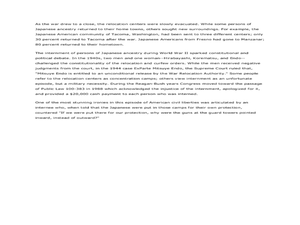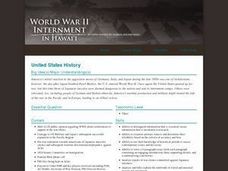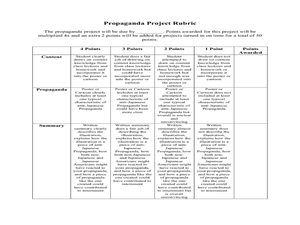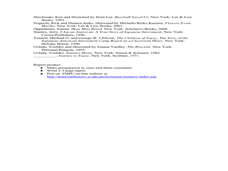Curated OER
Lesson 3: Japan's "Southern Advance" and the March toward War, 1940-1941
High school historians interpret historical evidence presented in primary resources to decide if the southern advance was a reckless step toward war, or if it was reasonable. They research the Japanese southern advance tactics during the...
Curated OER
Pearl Harbor
Young scholars identify the location of Pearl Harbor and Hawaiian Islands on a map. In this map skills lesson, students use latitude and longitude coordinates to locate various places of importance of the Pearl Harbor attack.
Curated OER
A Boy at War: A novel about Pearl Harbor by Harry Mazer
This A Boy At War PowerPoint introduces the historical context of the novel and information about the novel's author. Facts and trivia about Pearl Harbor that are relevant to the novel's plot are reviewed. Historical photos and a map of...
Curated OER
Surprise at Pearl Harbor
Students review the concept of courage and relate it to their daily life. As a class, they are introduced to the events of December 7, 1941 at Pearl Harbor. Using a map, they locate Hawai'i and label the islands. They use the internet to...
Curated OER
December 7, 1941 - Pearl Harbor
In this writing prompt worksheet, students learn that on December 7, 1941, the Japanese attacked Pearl Harbor in Honolulu, Hawaii. Students research five facts about the event using classroom resources and summarize the facts into their...
Curated OER
A Date Which Will Live In Infamy
Students use President Franklin D. Roosevelt's radio address following the attack on Pearl Harbor as a primary source to explain American reaction following the attacks. They explain how different Americans reacted to FDR's call for war.
Curated OER
Pearl Harbor: December 7, 1941
In this crossword puzzle worksheet, students complete the crossword puzzle by solving the 13 clues at the bottom of the page. The theme of this worksheet is Pearl Harbor.
Curated OER
World War II - Memory Book
Eighth graders read about and reflect upon a variety of events that occurred during World War II. They conduct research on the Holocaust and Anne Frank's life, the attack on Pearl Harbor, American life during this time and the bombing of...
Curated OER
Introduction to Japanese Internment
Students discover details about Japanese Internment. In this World War II lesson, students analyze images and documents related to the movement of Japanese-Americans to West coast internment camps in the wake of the Pearl Harbor attacks....
Curated OER
America and the Sino-Japanese Conflict, 1933-1939
Students examine the U.S. stance regarding the Sino-Japanese conflict. In this diplomacy lesson, students analyze the sanctions employed by United States on Japan when they took over Manchuria. Students determine how actions by the...
Curated OER
Farewell to Manzanar: Racism and Point of View
Learners create a presentation on the computer of the reactions and memories of people who were around during the attacks at Pearl Harbor. In this Pearl Harbor lesson plan, students interview people who were there, discuss the racism,...
US National Archives
WWII: The Atlantic 1939-45 – Battle of the Atlantic
The most dangerous line of attack during World War II wasn't the German planes soaring above Britain, but the U-Boats cutting off their supplies of food and equipment. Learners research the Battle of the Atlantic, the German campaign to...
Curated OER
The Aftermath
Students examine photographs of the attack on Pearl Harbor. They discuss the damage that occured on December 7, 1941. They debate whether the attack was a success or not for the Japanese.
Curated OER
Italian Enemy Aliens During World War II: Evacuation from Prohibited Zones
Students read and discuss the Enemy Alien Evacuation Order. They perform research by reading newspaper articles from February 1942 as well as investigating available information on the Internet. Students work in groups to create a...
Curated OER
Wives and Mothers in WWII
Eighth graders explore the effect of World War II from a financial standpoint. In this World History lesson, 8th graders review World War II through teacher lecture, reading and viewing pictures and cartoons, then discuss the hardships...
Curated OER
American Foreign Policy: 1920 - 1941
Take your class through the period between World War I and World War II. Covering various treaties and pacts between America and its neighbors - namely, Japan, Germany, and the Soviet Union- these slides could inspire some political...
Curated OER
The Home Front: Convincing Americans to Help America Prepare
Sixth graders examine the actions of the U.S. Government after the attack on Pearl Harbor. In this preparation for war lesson, 6th graders analyze WWII posters and view a clip on the American Home Front. Students discuss and list the...
Curated OER
Pearl Harbor vs September 11 Attack
High schoolers compare and contrast the events of the Pearl Harbor Attack and the attack on September 11, 2001 by examining the similarities and differences between these two events.
Curated OER
World War II: Internment in Hawaii
Students examine world history by writing an essay in class. For this World War II lesson, students identify the attack on Pearl Harbor, the response from the U.S and the effect it had on Japanese-Americans. Students define Japanese...
Curated OER
Japanese American Internment: Examining Racial Tensions
Students discover how racial tension led to Japanese Internment. In this World War II lesson, students analyze political cartoons and posters related to the movement of Japanese-Americans to internment camps in the wake of the Pearl...
Curated OER
Arab Americans: In the Aftermath of the Terrorist Attacks on the U.S.
Students examine the effects of the terrorist attacks in 2001. In this lesson on discrimination and the dangers of stereotyping, students will expand their understanding of stereotyping in contemporary society and compare in to similar...
Curated OER
Lesson III: Crisis, Pearl Harbor, Internment
The third in a series of lessons introduced by “A Fence Away From Freedom,” uses the Smithsonian website, “A More Perfect Union: Japanese Americans and the U.S. Constitution” and focuses on the section of the presentation devoted to the...
EngageNY
Studying Conflicting Information: Varying Perspectives on the Pearl Harbor Attack, Part 1
Scholars read President Roosevelt's Day of Infamy speech and analyze the speech's words using close reading guides. Readers determine Roosevelt's point of view after reading the speech and filling in the guides.
EngageNY
Studying Conflicting Information: Varying Perspectives on the Pearl Harbor Attack, Part 2
Scholars take another look at Japan's Fourteen-Part Message. They then take turns adding ideas to sentence starters to create ideas about the different perspectives of government. To finish, groups mix and mingle to share their sentences...

























